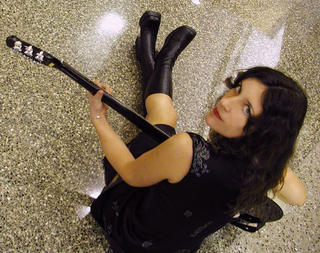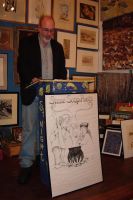
Afaa Michael Weaver is a professor of English At Simmons College. This essay is about his recent trip to China. Weaver will be participating in The Somerville News Writers Festival, November 13 2005 at the Somerville Theatre in Davis Square.
The Meaning of Chinese
By Afaa Michael Weaver
Autumn in Taiwan resembles a New England spring, and so it was when I landed in Taipei to spend about eight months studying Chinese. Taiwan is the gateway to Chinese culture for me. It is there that Perng Ching-hsi, a major translator and Shakespearean specialist at National Taiwan University (NTU), gave me my Chinese name, Wei Yafeng. That was three years earlier. This third time in Taiwan I lived in an apartment on the sixteenth floor of a triangular shaped building in the busy and upscale neighborhood near Sogo’s, a popular Japanese-owned department store.
It was two thousand four, the year of my sabbatical leave.
Living on the sixteenth floor, I could feel the earthquakes when they came, and as a black man studying Chinese inside Chinese culture, I caused milder earthquakes. Chinese people are not immune to racial perceptions given to the world by colonialism and slavery, but those perceptions are not grounded in the mendacity that--in America--is pervasive. The culture maintains respect for professors, and I was so often awash in kindness during this time of my immersion studies of the language. The love that comes to me is given in gratitude for me just being me, which is quite nice.
After five months of daily two hour tutorials and three hours of homework at the Taipei Language Institute, I made my way to China to spend time with other poets who came to the international conference on Chinese poetry I convened at Simmons College, where I teach, just before moving to Taiwan. I met with a number of poets in Taiwan, and now I was headed to China for a two week tour of three places. In Hai Nan Wang Xiaoni and her husband met me at the airport with open arms.
Hai Nan’s pepper trees sit in the fields alongside the highway look as if they belong in a fairy tale. On the campus of Hai Nan University there is a pool full of lotus plants. The university is a vast place, occupying an island of its own in the northern part of the province, China’s southernmost point and a base of economic development that includes huge luxury hotels on the southeast coast where the beaches are clean and look out onto Nan Hai, which means Southern Sea.
At the airport going to Kunming from Hai Nan, Wang Xiaoni set me in line with the other passengers with specific instructions to pay attention to the signs. On the plane I made friends with ladies from Kunming who were so delighted to speak with me in Chinese that they officially welcomed me to the city. Yu Jian was waiting for me just on the other side of the baggage claim area, and we met each other with a big hug as onlookers smiled and cheered.
Yu Jian lives near a park where he played as a child, and we took a walk there in the afternoon, watching people playing music and singing as they usually do when the weather is good, and it is difficult to imagine the weather as being anything put perfect in Kunming. After a reading at a nightclub called the SpeakEasy, a large group of us, poets and artists all, enjoyed a sidewalk barbecue that lasted past midnight, which is late for me. I did not want to leave. I did not want time to move.
In Beijing it was the weeklong poetry festival at Beijing University, and poets from all over the country were there, some with dialects and accents even Beijing natives could not decipher. My host was Bei Ta, who was happy to see me use my third year Mandarin, and on one day we poets spent a whole day together, led by Zang Di, who teaches in the Chinese literature department. Beijing is old and big, but when we climbed the mountain to Mao Zedong’s retreat, the city was not visible, hidden as it was by the foliage and winding paths up to the stone monuments and gardens.
Mr. Chin Ligang, director of the Chinese Writers’ Association, presented me with a gold friendship medal in recognition of my work in holding the poetry conference. Afterwards we had lunch, and it was explained to me that such a meal was only successful when someone passed out from drinking. With orange soda pop in hand, it was a long way to success for me.
Bei Ta suggested I modify the Wei in my name to indicate flourishing, and after some discussion, my friends in Taiwan accepted the change.
Back in Taipei I took two days to rest before going to school for two days, and then that weekend I went to He Nan Buddhist Temple in Hualien on Taiwan’s eastern coast. Dr. Yu Hsi, poet, writer, and spiritual teacher, is the director. He invited me there to teach Taijiquan to the monks and make use of the inspirational spiritual energy that lives there. Teaching Taiji was a joy, as the monks are dedicated students and not without their sense of humor. They made me promise to return next year. It was the last day of class, our classroom the shaded area in front of the smaller temple, with the sound of the ocean sliding off the edges of rocks on the shore, just a stone’s toss away.
My immersion experience was about eight months, and my Chinese has improved, according to the reports of my friends in Taiwan and China. My plans are to return for a longer stay doing the same, studying at the Taipei Language Institute, spending time at He Nan Temple studying the culture, and traveling into China.
Meanwhile, I continue studying my Chinese. Here in Somerville, I take the quiet time of early morning to practice my writing or to go over my recitations by reviewing dialogues, playing all the parts, memorizing the tones again as what you mean depends so much on how you say it in Chinese.


















































